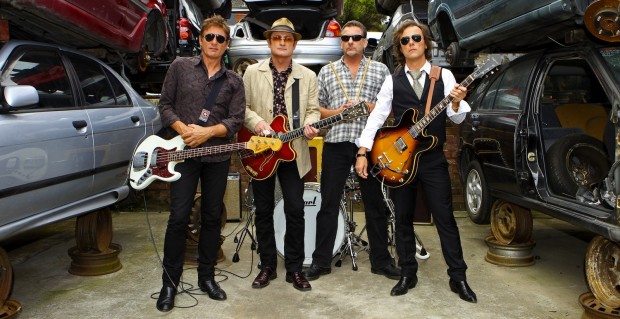 The Hoodoo Gurus are joined by You Am I, The Whitlams, Dave Graney & The Mistly and Rainy Day Women for an Evening On The Green on Saturday, November 16, at Kings Park & Botanic Garden. BOB GORDON reports.
The Hoodoo Gurus are joined by You Am I, The Whitlams, Dave Graney & The Mistly and Rainy Day Women for an Evening On The Green on Saturday, November 16, at Kings Park & Botanic Garden. BOB GORDON reports.
It’s amazing to consider that the Hoodoo Gurus, in what is their second life, have been back together for 10 years.
But even when they did break up in 1998, one of their old friends, The Fleshtones, who would go on to join the Gurus on 2012’s inaugural Dig It Up invitational, seemed to be having a glimpse of the future.
“When we did break up,” Dave Faulkner once recalled to this writer, “I saw the guys from The Fleshtones and they were like, ‘Dave, bands don’t break up these days. They just don’t’. They just didn’t believe me (laughs).
“They said, ‘You don’t break up a band anymore. That’s old. That’s how things used to be. Just keep making music. Something will happen and you might want to do something’.”
That they did, with 2004’s Mach Schau LP, loads of touring and then another album in 2010, Purity Of Essence. The band have now staged two Dig It Up invitationals, this year’s devoted to 1985’s Mars Needs Guitars. 2012 also saw the compilation LP, Gold Watch, which also included new material.
The man responsible for writing such memorable, bona fide classics as I Want You Back, Bittersweet, Like Wow – Wipeout!, What’s My Scene, Miss Freelove ’69 and 1000 Miles Away, has a proven strike rate. Not that he’s focussed on writing pre-destined ‘hits’ – Faulkner simply writes songs that sound good to his ear.
“You don’t know when you are writing a song as to where it is going to end up,” he told X-Press last year. “It is not until you play them live that you start to get feedback from observers that can give you some sort of measure.
“Like Wow – Wipeout! we recorded thinking that we could make a bit of a racket and have some studio fun. It was back before B-sides were something that was never heard again, they were real collectors items so we didn’t just put on any throwaway rubbish. We were happy to have it as a B-side but we didn’t think it was a bad song. We didn’t have any ambitions for it, other than that. It wasn’t until the producer was at us to put it on the album Mars Needs Guitars, that we had our biggest hit.”
As for radio airplay, it’s always been up and down for the Gurus. Faulkner’s given up trying to work that little mystery out.
“It is funny because in 1996 we had a song called Waking Up Tired which is a pretty good power pop song and when the record company went to one of the radio stations, the station director said ‘Have the Hoodoo Gurus decided to come in from the cold yet?’ All through our career, all of our albums have had hits, and yet radio is still deciding if we are the kind of band that they should be playing, so what can you say to that?”
When the WA Museum staged the Spin: WA Music From Underground To On The Air exhibition in 2004, some of Faulkner’s possessions were a highlight, including an old exercise book from the early ‘80s with lyrics and illustrations. A technically excellent black pen drawing of a ghost ship docked next to the lyrics of Deathship (co-written by Rodney Radalj, who co-founded the band along with James Baker in 1981).
The hand-written words to My Girl appeared also, a song, as it turns out, that was written for a scene in an imagined (and unrealised) film.
“I love films and I’m kind of known for having an appreciation of trash culture and also ‘60s culture,” Faulkner says. “I was a kid in the ‘60s and I remember it. I saw the repeats of the Gidget films a lot. I kind of liked this idea of Gidget being an innocent beach girl being corrupted by some evil hippies and basically having her mind expanded. My Girl was the song you’d hear on the radio before she had her mind expanded.”
It certainly gives another dimension to the notion of songwriter and song and perhaps a glimpse into why Faulkner’s songs have lasted across decades.
“You use different tools to write and different things to inspire you,” he says. “You always hope that songs do that and have their own life beyond what the writer imagines for them.”